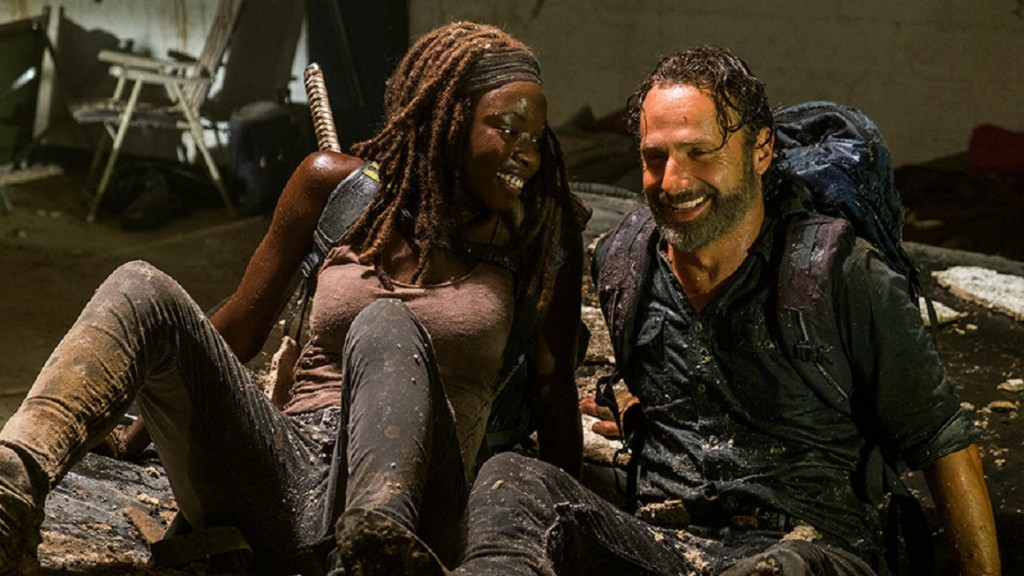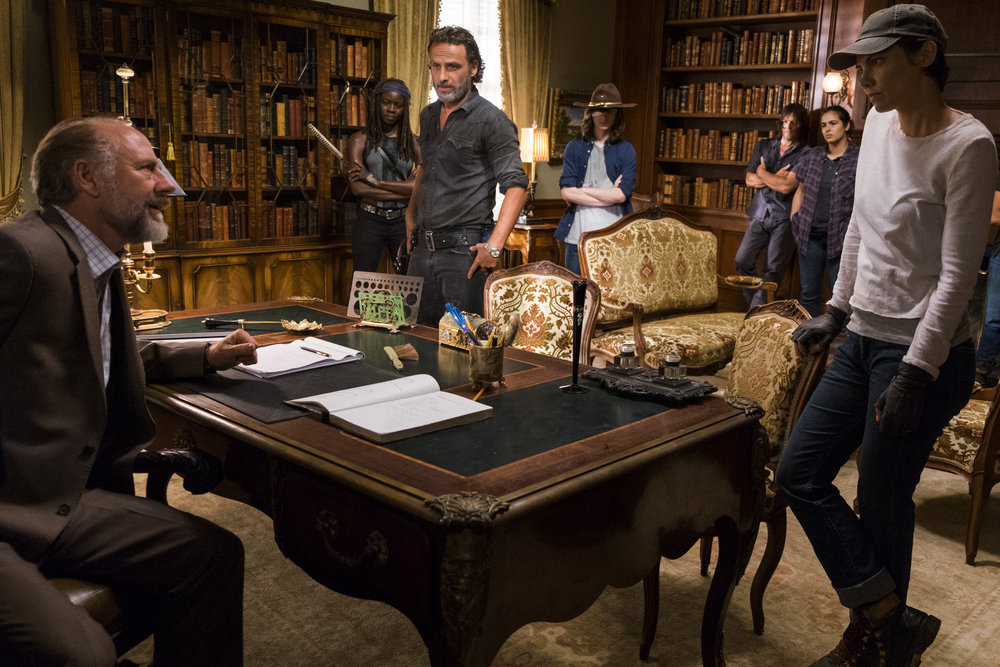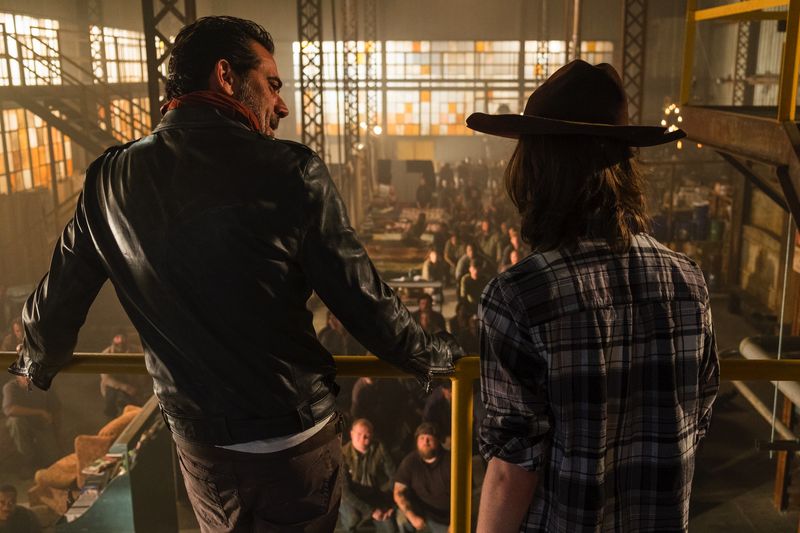-
Recent Posts
- Better Call Saul: There Are No Happy Endings between a “Rock and Hard Place”
- Black Widow Keeps It in the Family for Natasha’s Last Ride
- Loki Finds New Purpose in the Man behind the Mischief
- In its Debut, Star Wars: The Bad Batch Decides Whether to Obey or Rebel
- Nomadland: A Film Out of Time, For Our Times
Archives
Recent Comments
- Ed Clarke on Contact
- Matt on Why “The Frying Game” Is a Dark Horse Contender for The Simpsons’s Worst Episode Ever
- Lilly Dow on Contact
- Stacey on Veep’s Series Finale and the Hollowness of Getting What You Want
- Evan Jaocbs on Contact
Meta
Tag Archives: The Walking Dead Season 7
The Walking Dead Redeems its Season Premiere in “The First Day of the Rest of Your Life”

There was a hue and cry after the Season 7 premiere of The Walking Dead. Two characters we knew and cared about died, and people were undeniably, understandably upset. Some of that reaction stemmed from the mere brutality of it – the protruding eyeball and the last gasps and the earth stained with bloody mush of it all. But more of it stemmed from the senselessness of those deaths – the sense in which these individuals had perished not as the culmination of their journeys, but as fodder for puffing up the series’s new biggest of big bads, turned into sacrifices made on the altar of “this guy means business.”
The Walking Dead: Killing Is a Strategic Choice, Not a Moral One in “Something They Need”
The Walking Dead spends a great deal of time ruminating on what it means to take a life. That sort of thing is practically inevitable in zombie stories. You may have to kill the zombies; you may have to kill dangerous rival survivors; and you may have to allow good people to die in order to ensure your own survival. Weighing these sorts of choices is the bread and butter of the zombie genre and post-apocalyptic fiction of all kinds.
But most of the time, at least on The Walking Dead, it’s framed as an ethical choice, or processed through the lens of what taking a life does to the human soul. For all the hand-wringing about the supposed bad messages the series sends, TWD is and always has been a show firmly centered on moral questions. People don’t always like the answers it provides, but it’s been consistently interested in the ethics of killing, the impact the act has, and what sort of morality and mortality remains after the fall of civilization.
So once more, The Walking Dead offers an episode centered around people deciding whether or not to kill. But in “Something They Need,” the show treats it as a question of prudence, of planning, of strategy, rather than of morals. Whether it’s Sasha, Gregory, or Natania, the major characters in this episode contemplate if they should kill, but they don’t seem to be affected by moral considerations so much as practical ones. Will it help them accomplish their goals? Will it advance their cause? Will it hurt, help, or save their people, or their own skins? That’s not a typical tack for this show, but it’s an interesting one, even as the slow table-setting for the finale soon feels a bit rote.
The Walking Dead: Finding Fault and Absolution on “The Other Side”

Fault is a slippery concept. It’s bundled up with intentions, results, and a host of other complicating factors, all of which affect whom we blame and whom we absolve when things go badly. Some people wrong us without meaning to. Others intend to hurt us but inadvertently give us exactly what we need. And some people simply twist in the wind, unsure or unaware of the damage they do to others. How we credit and blame people for their actions and inaction says as much about who we are as it does about the person we’re judging.
But how we move past those assessments of fault, whether we’re blaming others or blaming ourselves, can be just as telling. It matters how we try to overcome, or avoid, the bad blood, hurt feelings, and guilt. In “The Other Side,” Daryl blames himself, Gregory bends over backwards to avoid any perception of fault, and Sasha and Rosita hash out their awkward, shared part in Abraham’s life and death, each trying to figure out where they fit into this intricate ethical hierarchy.
The Walking Dead: Flashes of Past Traumas Reemerge for Morgan in “Bury Me Here”

Moments flash before Morgan’s eyes. His sanity begins to slip as he falls back into disjointed ramblings once more. The lives taken, the lives lost, the lives tainted, all linger with him, brought to the surface again: Ezekiel, Richard, Carol, Benjamin, Duane.
That sort of thing always gets me — montages of past events, the images of old faces and old places returning in a grand, dizzying cacophony. Something about the rush of those little moments makes an impact. I know it’s a device. I know how manipulative it can be. And yet, I cannot help but find it affecting.
So when Morgan starts to lose his mind again, to crack from the equal and opposing pressures of his pacifist philosophy and a world that requires something different to protect those with their futures still ahead of them, I cannot help but feel it too. “Bury Me Here” is not The Walking Dead’s finest hour — more than a few clunky moments see to that — but it’s an episode centered around Morgan’s moral turmoil, the fault lines of his ethical stance, and that gives it power, in harmony with and apart from the glimpses of the path that led him here.
The Walking Dead Finds the Joy at the Edge of the Abyss in “Say Yes”

For a while now, the running line on The Walking Dead has been that the show is too bleak and too steeped in misery. The open-ended nature of the series, and thus the requirement for ever more adventures, means our heroes can never truly win. The abject state of the world has to continue. So for the plot to have any bite, people we care about have to keep dying; equilibrium can’t ever be established, and more problems and obstacles and losses have to pile up.
It’s understandable how the prospect of that continuing struggle wears on critics and viewers alike. Maybe I’m just jaded from years of post-apocalyptic fiction and other gritty works that allow me to take this sort of thing in stride. But I get it; the notion that this is simply the unending march of The Walking Dead, never to cease, with characters we like continually being picked off, could easily be too much for people.
But what I like about the show, what keeps me coming back (and, incidentally, what’s always underemphasized when this debate picks up again and again) is that The Walking Dead is also a show about what motivates people to go on in these circumstances. It’s about the emotions and connections that give the survivors something to fight for when there’s no institutions or societal expectations to force them to do it. It presents a world of outrageous freedom, one where people still choose to sacrifice and to love, where there is still joy and comfort regardless of whether the environment is hospitable to it.
Posted in Television, The Walking Dead
Tagged Michonne, Rick Grimes, The Walking Dead S07E12, The Walking Dead Season 7
Leave a comment
The Walking Dead Nods at Breaking Bad and Examines Eugene and Dwight in “Hostiles and Calamities”

One of the questions The Walking Dead has interrogated from the very beginning is whether the end of the world and the ensuing social breakdown changes people, or whether it just reveals who they truly are. The show has often played around with the idea that the end of civilization and the lack of rules and order that otherwise keep people in line can forces those caught up in the unrest to become different in order to survive. But it also suggests that for others, the fall of society just gives them license to be who they were the whole time.
The centrality of that question in “Hostiles and Calamities” fuels the episode, a slower character piece, but also uses it to pay subtle tribute The Walking Dead’s network-mate. Breaking Bad. Fans of Vince Gilligan’s seminal drama know the significance of a character hanging onto a cigarette with a loved one’s lipstick still on it. We’re familiar with the notion of a former science teacher enjoying the spoils of war, formulating poisons, puffing himself up, and taking to his new role a little too easily. Most of all, Breaking Bad-watchers can appreciate the exploration of whether changed circumstances may change a person or if they simply let the beast out of the cage.
The Walking Dead Can’t Decide Whether It’s Real or a Cartoon in “New Best Friends”

Realism is always going to be a tricky needle to thread for The Walking Dead. On the one hand, a big part of the show’s claim to fame is the way it takes the well-worn idea of the zombie apocalypse and plays it seriously, sometimes overly seriously. That’s in its DNA. On the other hand, it’s also a show where corpses come back to life, civilians can use weapons like pros with minimal training, and the undead recur in some new obstacle course-like form on a weekly basis. The very premise of the show means that The Walking Dead can’t exactly be as down-to-earth or grounded as its naturalistic aesthetic might suggest, and that’s simply part of the deal.
But sometimes, the series just pushes things too far. The Junkyardigans (my name for the collective that congregates at the dump, at least until an official one is offered) read as silly from the word go. Our heroes have run into plenty of colorful groups before — The Terminites, The Wolves, and the dibs-based biker gang come to mind — but they tend to read as pulpy rather than cheesy. It’s a fine distinction, to be sure, but the difference is that as wild as those groups could seem at times, their outsized characteristics seemed to fit into a certain exaggerated, over the top quality that’s present throughout the series. The Walking Dead isn’t just real; it’s hyper-real, and its more extreme villains and antagonists fit well enough within that atmosphere.
The Walking Dead: Two Good Bits Stand Out in the Doldrums of “Rock in the Road”

The Walking Dead is a frustrating show for a multitude of reasons, not the least of which is that even in an episode like this — one filled to the brim with dull speechifying, blatant wheel-spinning, and lame parables — there’s one or two moments of brilliance that make it hard to just give up on this ever-mercurial series. Even when the show is stalling for time, serving up weak dialogue, or leaning into its weakest tendencies, it sprinkles in a couple of great bits that manage to rise above the rest of the flotsam.
This week, it’s the zombie cheese slicer and Rick’s smile, two dissimilar but connected moments that demonstrate what The Walking Dead is capable of when it’s not tripping over its own bad lines and plot contrivances. Such faults are out in full force in “Rock in the Road,” an episode that sees Rick and the gang at The Hilltop and The Kingdom in an effort to rally forces sufficient to take on The Saviors. The forging of that coalition is inevitable, and the arguments over whether to unite and fight or cling to the status quo have already been turned over by dozens of people dozens of times, which leaves “Rock” with only the thrilling walker-slaying sequence and a brief but clever way to convey Rick’s state of mind to recommend it.
Posted in Television, The Walking Dead
Tagged Episode Reviews, Rick Grimes, The Walking Dead Season 7, Zombies
Leave a comment
The Walking Dead: The Division and Reunion in “Hearts Still Beating”

Since at least the middle of the show’s fourth season, The Walking Dead’s M.O. has been to divide and conquer. As the show’s cast of characters has grown, more and more often its episodes focus on just a handful of individuals, typically separated from the rest of the group. That makes the series’s season premieres and season finales (or mid-season finales), where everyone joins back together, feel almost like crossover episodes.
But it also makes them feel like reunions. The time apart for these characters doesn’t just give us a thrill when they link up once more, but makes us miss their interactions and shows us the value of their cooperation, and even their mere shared presence, through its absence. That fits the theme of “Hearts Still Beating,” which shows any number of survivors attempting to solve the season’s big problems on their own, trying to carry the entire load on their backs, only to realize that what they hope to achieve can only be accomplished by working together. “Hearts Still Beating” is not a great episode of The Walking Dead, but in this vein, it works for what show’s going for.
The Walking Dead: “Sing Me a Song” Asks Whether Negan is a Hero or a Villian in his Own Mind

There’s an old saw that says the best villains are the ones who believe they’re the hero of the story. “Sing Me a Song” leaves the viewer wondering if that’s true for Negan in an episode that spends even more time acquainting the audience with him and his fiefdom. There are moments when it seems like Negan truly believes he’s doing good, bringing the progress and security of civilization back to an untamed world. There are others when it seems like he simply enjoying himself within his own twisted version of Disneyland. It’s unclear which of those things he really believes, or if he’s even aware of the distinction. But that ambiguity helps make him The Walking Dead’s most interesting villain yet.

